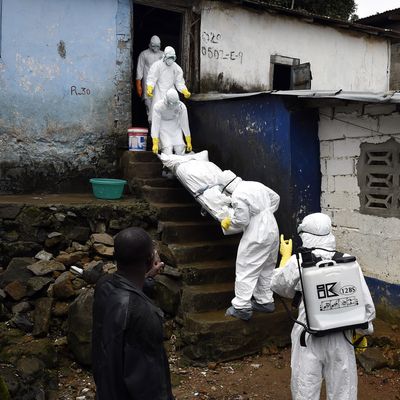
Yesterday, the Centers for Disease Control and Prevention announced that Texas doctors have diagnosed a patient with Ebola, marking the first case found in the United States — and rumors are running rampant about a second case. This is terrible news in general, and scary news for Americans. But it might be good news in terms of helping flush research funding toward the fatal virus.
Ebola lacks many of the characteristics that give private pharmaceutical companies an incentive to invest. It afflicts a small number of people, most of whom are very low-income individuals living in very low-income countries. That means that even if a company did spend the millions or billions of dollars necessary to develop a treatment, it would deliver it only to a limited market with extremely constrained financial resources.
Those long-standing economics help explain why so many billions of dollars flood into the investigation of erectile dysfunction and diabetes, and so few into the investigation of Ebola and other tropical diseases.
But as soon as the CDC press conference happened, the stocks of the handful of companies invested in Ebola research surged. Take Tekmira Pharmaceuticals, Canadian a firm working on a treatment along with the Department of Defense. Its stock is up about 20 percent. Shares of BioCryst Pharmaceuticals, Newlink Genetics, and Sarepta Therapeutics also jumped.
Why? In part because the press conference signaled that the market for Ebola treatments could be bigger and higher-income than previously thought. If American insurers and European governments are going to want to buy Ebola drugs, pharmaceutical companies are going to want to produce them. It also might have indicated that more public research funding — and there are tens of billions of dollars of it — might be headed Ebola’s way.
It is rich-country public funding that is already instrumental in the development of drugs for Ebola. Even if in a horrible turn of events the outbreak got much bigger, it still seems unlikely that the disease would become a major moneymaker for Big Pharma. But the United States government has devoted millions to developing treatments, as have European governments, and those numbers might increase.
But the best use of public dollars right now would be to boost the public-health infrastructure in West Africa. That’s what the CDC itself argues: “The most effective way to stop the current Ebola outbreak in West Africa is meticulous work in finding Ebola cases, isolating and caring for those patients, and tracing contacts to stop the chains of transmission,” it said. “This is how all previous Ebola outbreaks have been stopped.”
To that end, Congress has approved the use of leftover funds from the Afghanistan war in West Africa. But the lion’s share of the money remains held up in Washington, while the disease overwhelms hospitals, workers, towns, and families, and claims hundreds of lives.





























